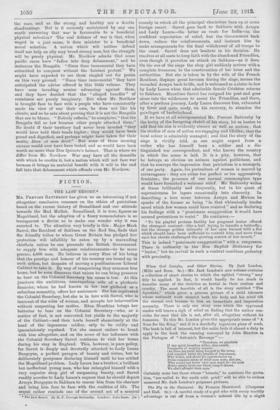FICTION.
THE LAST RESORT.* Mn. PREVOST BATTERSBY has given us an interesting if not altogether conclusive romance on the ethics of patriotism based on the recent history of Somaliland and our attitude towards the Mad Mullah. Somaliland, it is true, figures as Magaliland, but the adoption of a fancy nomenclature is so transparent a device as to make one wonder why it was resorted to. The situation very briefly is this : Major Mark Sarrol, the Resident of Sakhara on the Red Sea, finds that Ike friendly tribes to whom Great Britain has pledged her protection will infallibly be eaten up by a marauding chieftain unless lie can persuade the British Government to supply him with adequate reinforcements—to be more precise, 4,000 men. He believes in every fibre of his being that the prestige and honour of his country are bound up in such action, but despairs of moving a pusillanimous Liberal Cabinet to take it. By way of temporizing they summon him home, but he soon discovers that unless he can bring pressure to bear on the Colonial Secretary his cause is lost. At this juncture the ambitious, unscrupulous wife of a plethoric financier, whom ho had known in her raw girlhood as a suburban nonentity, offers her assistance. She has captivated the Colonial Secretary, but she is in love with Sarrol, who is innocent of the wiles of woman, and accepts her intervention without suspecting her motive. Rhea Heseltine brings her batteries to bear on the Colonial Secretary—who, as a matter of fact, is not converted, but yields to the majority of the Cabinet—and then hurls herself shamelessly at the head of the ingenuous soldier, only to be coldly and ignominiously repulsed. Yet she cannot endure to break with him altogether, and on the score of her influence with the Colonial Secretary Sarrol continues to visit her house during his stay in England. This, however, is pure policy, for Sarrol is deeply and devotedly attached to Lady Laura Burgoyne, a perfect paragon of beauty and virtue, but he deliberately postpones declaring himself until he has settled the Magaliland problem. Lady Laura has a brother, a brilliant but ineffectual young man, who has entangled himself with a very superior shop girl of surpassing beauty, and Sarrol readily accedes to Lady Laura's request that he should deport Armyn Burgoyne to Sakhara to rescue him from his charmer and bring him face to face with the realities of life. The sequel rather reminds one of the second act of a musical • Tao Lalt &sort. By H. F. Prevost Battersby. London: John Lane, [Gs) comedy in which all the principal characters turn up at some foreign resort. Sarrol goes back to Sakhara with Armyn and Lady Laura—the latter en route for India—in the confident expectation of relief, but the Government back down, reduce the reinforcements, and instruct him to make arrangements for the final withdrawal of all troops to the coast. Sarrol does not hesitate in his decision. He resolves at all costs to keep faith with the abandoned Friendlies, even though it provokes an attack on Sakhara—as it does. On the eve of the siege the shop girl suddenly arrives with a complete trousseau, to the consternation of her lover and the authorities. But she is taken in by the wife of the French Resident, displays great heroism during the siege, nurses the wounded Armyn back to life, and is welcomed as a sister-in-law by Lady Laura when that admirable female Crichton returns to Sakhara. Meantime Sarrol has resigned his post and goes
alone into the wilderness to assist the Friendlies, and there, after a perilous journey, Lady Laura discovers him, exhausted by fever and quite ready, on his recovery, to abandon the privileges of bachelorhood.
If we have at all misrepresented Mr. Prevost Battersby by the levity of the foregoing sketch of his story, let us hasten to add that his aim is evidently sincere as well as serious ; that his studios of men of action are engaging and lifelike ; that the local colour is admirably managed ; and that the story of the
siege is vividly told, as one might expect from a. writer who has himself been a soldier and a dis- tinguished war correspondent, and who knows the country in which the scene is laid. It is a pity, however, that he betrays so obvious an animus against politicians, and that he conveys the impression that patriotism is a monopoly of one party. Again, his portraiture of women is marred by extravagance : they are either too perfect or too aggressively feminine; the presence of one normal commonplace type would have furnished a welcome relief. Mr. Battersby writes
at times brilliantly and eloquently, but in his quest of expressiveness he lapses occasionally into obscurity. In describing a love scene between Armyn and Miriam he speaks of the former as being "in that whimsically tender mood which few women could have resisted" and as declaring his feelings with a "passionate exaggeration it would have seemed pretentious to resist." He continues:—
" To his playful protean facility her pregnant lontor offered the strangest contrast—like a bull trying to transfix a butterfly; but the strange golden intensity of her eyes burned with a fire which should have boon sufficient to content him, and more than once her cheeks challenged the glowing scarlet of her mouth."
This is indeed "passionate exaggeration" with a vengeance. There is authority in the New English Dictionary for
" lentor," but its revival in such a context combines pedantry with preciosity.






















































 Previous page
Previous page